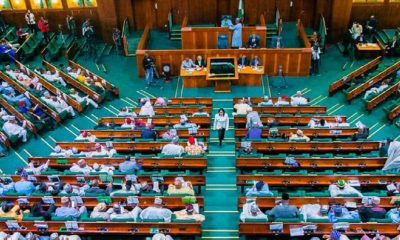News
Ease of Doing Business: FEC approves business facilitation, “Omnibus Bill”

As part of efforts to improve business environment in Nigeria, the Federal Executive Council (FEC) has approved the Business Facilitation (Miscellaneous Provisions) Bill, otherwise known as the Omnibus Bill.
This was disclosed in a statement sent to CAPITAL POST and signed by the Special Adviser to the President on Ease of Doing Business and Secretary of Presidential Enabling Business Environment Council (PEBEC), Dr Jumoke Oduwole.

The Omnibus Bill is seeking to amend twenty-three (23) business related laws in Nigeria and the overall benefits of the Bill include ensuring efficiency in public service delivery in terms of time, cost, and procedure for doing business, improving transparency, removing outdated provisions from relevant laws, and providing incentives to encourage Micro, Small, and Medium Enterprises (MSMEs) participation in business, among other things.
Dr Oduwole further explained that the bill provides for ease in the procedure for increase in share capital by including the option for such decisions to be determined by a resolution of the Board of Directors, subject to the provisions in the articles of association of the company or by the company in general meeting. More so, it is being proposed that the minimum number of independent directors for public companies be revised from three (3) to one-third of the Board.
The highlights of the Bill include the codification of the Presidential Executive Order 001 (001), which requires MDAs to publish licenses, permits, waivers, approvals, and other related information, among other things, in order to improve transparency and public access to information.
“The PEBEC is optimistic that the National Assembly’s consideration and anticipated passage of the Omnibus Bill into law in the not so distant future will further improve the business environment in Nigeria thereby attracting the much needed participation and investment from the private sector necessary to actualize the funding objectives of the National Development Plan 2021″, Oduwole noted.
Dr Jumoke Oduwole, said the Federal Ministry of Justice, the Nigeria Bar Association, the National Assembly Business Environment Roundtable and law firms were involved in the process.
According to the statement “The PEBEC Secretariat commenced a review of Nigerian Business Laws in 2017, together with several public sector and private sector stakeholders. This includes the Federal Ministry of Justice (FMoJ), the Section on Business Law of the Nigerian Bar Association (through the participation of over 40 law firms and consulting firms), the Nigerian Economic Summit Group and the National Assembly Business Environment Roundtable (NASSBER).
“Sequel to the review, the Secretariat invited submissions from various public sector stakeholders.
“In 2018, the PEBEC set up a sub-committee chaired by the Honorable Attorney General of the Federation & Minister of Justice (HAGF), Abubakar Malami, SAN to review and draft the Omnibus Bill.
“The first version of the Omnibus Bill was produced by the Federal Ministry of Justice (FMoJ) and presented to the PEBEC in 2019.
“Stakeholder engagements were thereafter held with various Ministries, Departments and Agencies (MDAs) to sensitize them on the contents of the first draft of the draft of the Omnibus Bill.
“In 2020, the PEBEC Secretariat invited additional submissions to the Omnibus Bill from both public and private sector stakeholders. These submissions were reviewed by a Technical Committee constituted by the PEBEC Secretariat which included both private and public stakeholders.
“The Bill was subsequently drafted and finalized by the Legal Drafting Department of the Federal Ministry of Justice in November 2021.
“The amendment of the Companies and Allied Matters Act (CAMA) 2020 with the recognition of electronic share certificates, electronic voting at annual general meetings, and other information is in tandem with technology best practices.
“The provisions of Nigeria Export Processing Zones Authority (NEPZA) Act and CAMA have been reconciled to recognize the exemption of free trade zone companies licensed by NEPZA from company registration.
“Furthermore, with the amendment of the Export (Prohibition) Act, the Minister of Finance, Budget & National Planning will now have clear cut powers to recommend goods that should be restricted from being exported.
“This will encourage flexibility in terms of prohibited products and prohibition scope, allowing them to align with economic realities at any given time”.

























